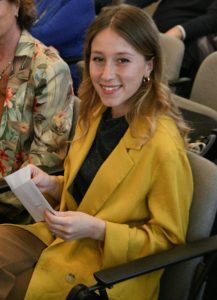 Martina Abbondanza è dottoranda di ricerca in Psicologia, Linguistica e Neuroscienze Cognitive all’Università di Milano-Bicocca sotto la supervisione del prof. Marco Marelli e della Prof.ssa Francesca
Martina Abbondanza è dottoranda di ricerca in Psicologia, Linguistica e Neuroscienze Cognitive all’Università di Milano-Bicocca sotto la supervisione del prof. Marco Marelli e della Prof.ssa Francesca
Foppolo.
Si è laureata in Linguistica nel 2018 presso l’Università degli Studi di Padova con una tesi sull’influenza della struttura sintattica sulla lettura in soggetti con dislessia da neglect. Il suo principale interesse è la relazione tra il linguaggio e le altre abilità cognitive (attenzione, cognizione numerica, memoria).
Il suo progetto di dottorato intende esplorare come alcune classi di parole vengono rappresentate nello spazio mentale.